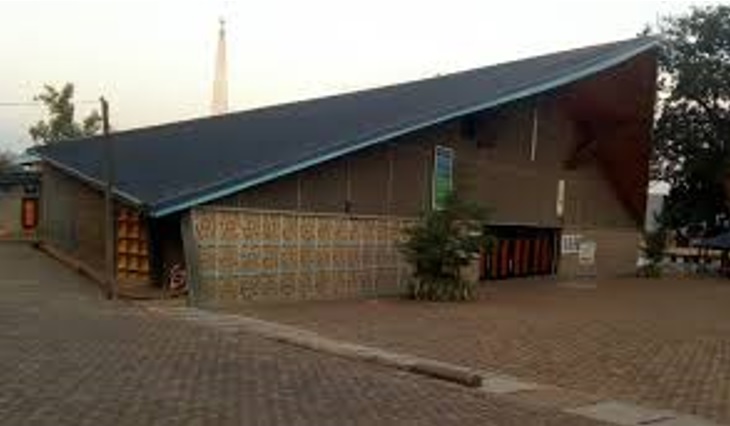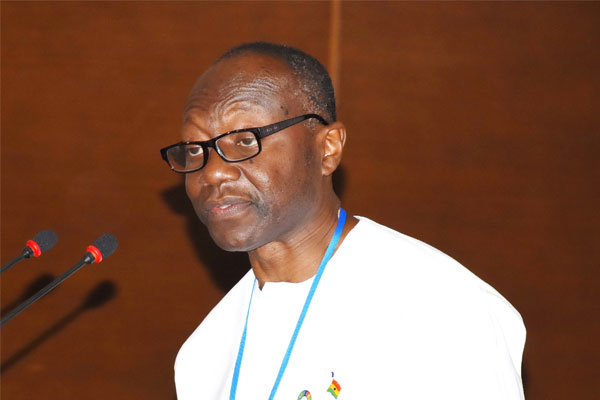|
Getting your Trinity Audio player ready...
|
This article is the Part 2 from last Monday’s, the one on ignoring Ken Ofori-Atta’s provocation on contributions to construct the so called “national” cathedral; it is also a continuation of the article that came before that, titled, “Of Development Projects, Mosques, Interchanges and Salaried Wives” in which I missed a vital historical point: The Larabanga Mosque. The entry below, on the ancient mosque, culled from the net is instructive:

“Listed as one of the 100 most endangered sites in the world, Ghana’s Larabanga Mosque was built in the Sudanese architectural style in the village of Larabanga in the West Gonja district, Savannah region. Founded in 1421, the Larabanga Mosque is the oldest in the country and one of the oldest in West Africa also referred to as the Mecca of West
Africa. The mosque has undergone restoration several times with the World Monuments Fund (WMF) contributing substantially to its restoration. The World Monuments Fund (WMF) lists the Larabanga Mosque as one of the 100 Most Endangered Sites. The mosque has an old Quran, believed by the locals to have been given as a gift from heaven in 1650 to Yidan Barimah Bramah, the Imam at the time, as a result of his prayers. Built with mud and reeds, the mosque has two tall towers in pyramidal shape, one for the mihrab which faces towards Mecca forming the facade on the east and the other as a minaret in the northeast corner.”
It escaped me completely when I was writing about the new mosque recently opened at Kawo Kudi Junction/Nima in Accra. I kick myself for that because if there is one mosque or faith-based structure in Ghana worth celebrating as “national” it is this one. It may be far away from Accra, the national” capital, but in terms of Islam or any of the Abrahamic faiths in Ghana, it certainly qualifies as a national icon. A historic structure that needs protection and preservation, which when properly marketed would certainly be a major source of growth for our tourism industry.
I have been to the mosque a few times myself and though unostentatious, I have always been humbled by its very true spirituality. I have not made the time to research it, but there are some members of my extended family who claim that our family tree has a branch that traces its root to that place. Flattering as that may be, the historical significance of the place in the religious development of the nation now called Ghana cannot and should not be downplayed.
The date mentioned above predates the construction of the Elmina Castle by a few years – the first European building in our country, which also housed a Christian place of worship, though meant only for the Christian slave traders.
The Presbyterian Church of Ghana is credited with being “the oldest continuously existing established Christian church in Ghana.” Founded “by the Basel missionaries on 18 December 1828” (source: the net), about the same time that the Reverend John Creedy (one of my past articles) was embarking on his own African spiritual epiphany.
Reverend John Creedy, the “civilised” and Christianized Ghanaian (appropriately Gold Coast) African who returned home from England to find the pull of his ancestors more powerful than the Father, Son and Holy Spirit and eventually reverting to form…
Today, centuries later, after Larabanga, after Basel, after John Creedy, modern Ghana seems in the grips of a religious fervour where adherents of the “Abrahamic faiths”, but especially Christianity and Islam are flexing muscles, sometimes even seeming like rattling their sabres as to who owns Ghana. John Creedy “failed” because his origins got the better of him. He saw more humanity in the native indigenes than the Christian rulers of the Empire, which “owned” the Gold Coast and converts. As such he aborted his Christianizing mission. But there were others after him who succeeded with the mission; so here we are now. The question we need to ask is whose rules, what rules do we follow on earth where we live, here and now? Christianity and Islam both are about the rest of your journey after departure from earth through death. So what does it matter who has the greater numbers here on earth? If we want to be honest about our existence on earth then let’s allow religion to be faith-based; if you must, explain it, but leave it to the individual to decide. Religion forced by politics as in the so called “national” cathedral, is just that: POLITICS!
We have a set of rules that guide us in a nation state: our constitution and other enacted laws. Be you the president, chief justice, speaker of parliament, minister, MP, etc., man or woman of God, you have no business imposing your faith on others. Yours is to uphold an atmosphere for individuals or groups to practice freely their faiths of choice or that in which they were born – or really, not to, at all!
A plural society like ours has room for all: Christians, Muslims, Bahais, Hindus, traditional cosmologies (Wulomei, Tindabas, etc). and even agnostics and atheists. If one of them – the non-Abrahamic ones, won an election and used the promise he made to his or her (g)God to set up an edifice with national resources to which we are compelled to shoulder the development, can you imagine the outcry of some faiths? Justified outcry, I must add, but that person would be fulfilling whatever pre-election promise he made to his deity(ies) to establish national structures dedicated to those deities. Discriminated-against faiths – or non-believers – would have the right to condemn and reject such an imposition. It would be totally within their rights to say, “Not in my name!” This so-called “national” cathedral is divisive and provocative. It is being forced down with almost cabalistic zeal, what with a stone from Israel as a cornerstone – a move very insensitive, even offensive, to adherents of other faiths that do not believe in such things. I have heard some rather uncharitable citizens speculate that it is all an occultist ruse drummed from a rather dubious man of God haunting the corridors of power – a kind of Ghanaian Rasputin!
Let us choose carefully what is national so we can all buy into it. The state should stay out of the imposition of religion with divide and rule programmes. The only thing the state can and should do is to create room for all the freedoms enshrined in our constitution to thrive.
As for the Ken Ofori-Atta types, it is essential we restrain ourselves or else their provocative acts or words, will bring the worst in us bubbling to the surface…Hopefully it wouldn’t come to that but there is one observation I cannot end without making: Anyone who has true faith in God knows that God does not make deals with anyone. God does not need anything from any mortal! It is so easy for some people to claim a relationship with God. Do we know if the deal was really with God or God is being used as a cover for someone’s delusions of grandeur? That, we have seen in Félix Houphouët-Boigny’s basilica in Cote d’Ivoire, “Emperor” Jean Bedel Bokassa’s Napoleonic makeover in the Central African Republic. He once converted to Islam, the underlying motive meant to impress Col Gaddafi of Libya to throw a little “nokofio” in his direction, or Mobutu Seseseku’s Gbadolite jungle paradise in Zaire now rotting away! Oh, sad, what delusions of grandeur and self-serving messianic impulses can lead us to…
And, on Larabanga again. It must be emphasised that, over the years, the Abrahamic religions in Ghana have contributed immensely to our changing architectural landscape. Some fantastic places of worship adorn the entire landmass. I recall for example, the Tamale Catholic Church. Constructed in 1967 when I was in secondary school, it was a must-see architectural masterpiece. I hope it has not suffered decay and neglect over the years. The style was starkly modernistic, with that great roof giving it a feeling of flight (see pic above).
In recent times, the charismatics/evangelicals have been trying to outdo the traditional churches and each other with their “mega” church buildings and if truth be told, some ending up as tasteless blobs. But some have exhibited good taste and balance. In fairness to all of them, though, they’ve achieved so much independently, from their own resources. No state/government involvement. Ghana is in no short supply of churches, temples, chapels, cathedrals and mosques, ergo, no need for state/government dabbling…
Amb. Alhaji Abdul-Rahman Harruna Attah, MOV





